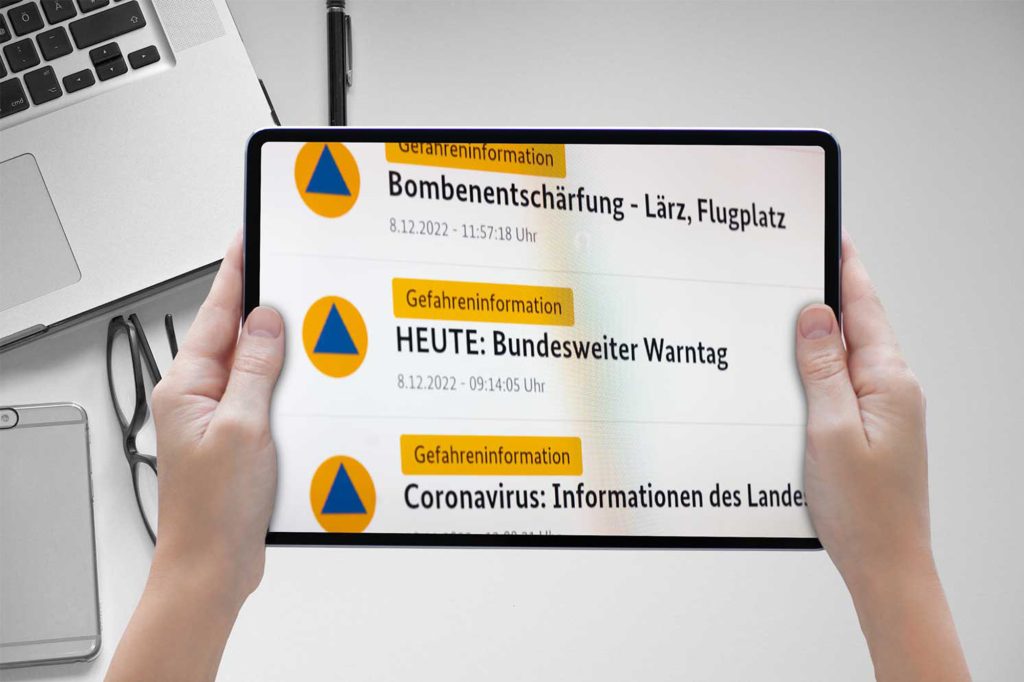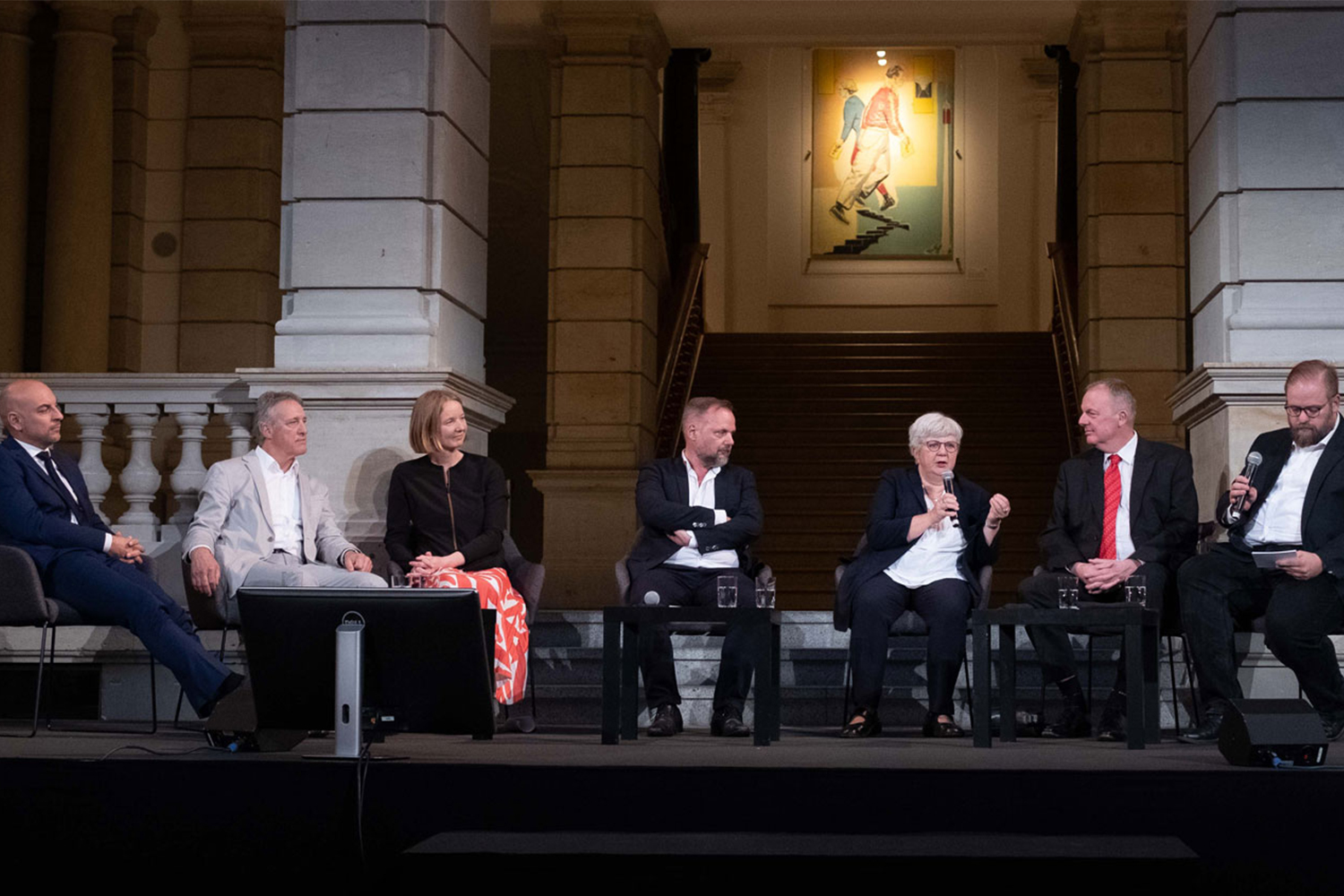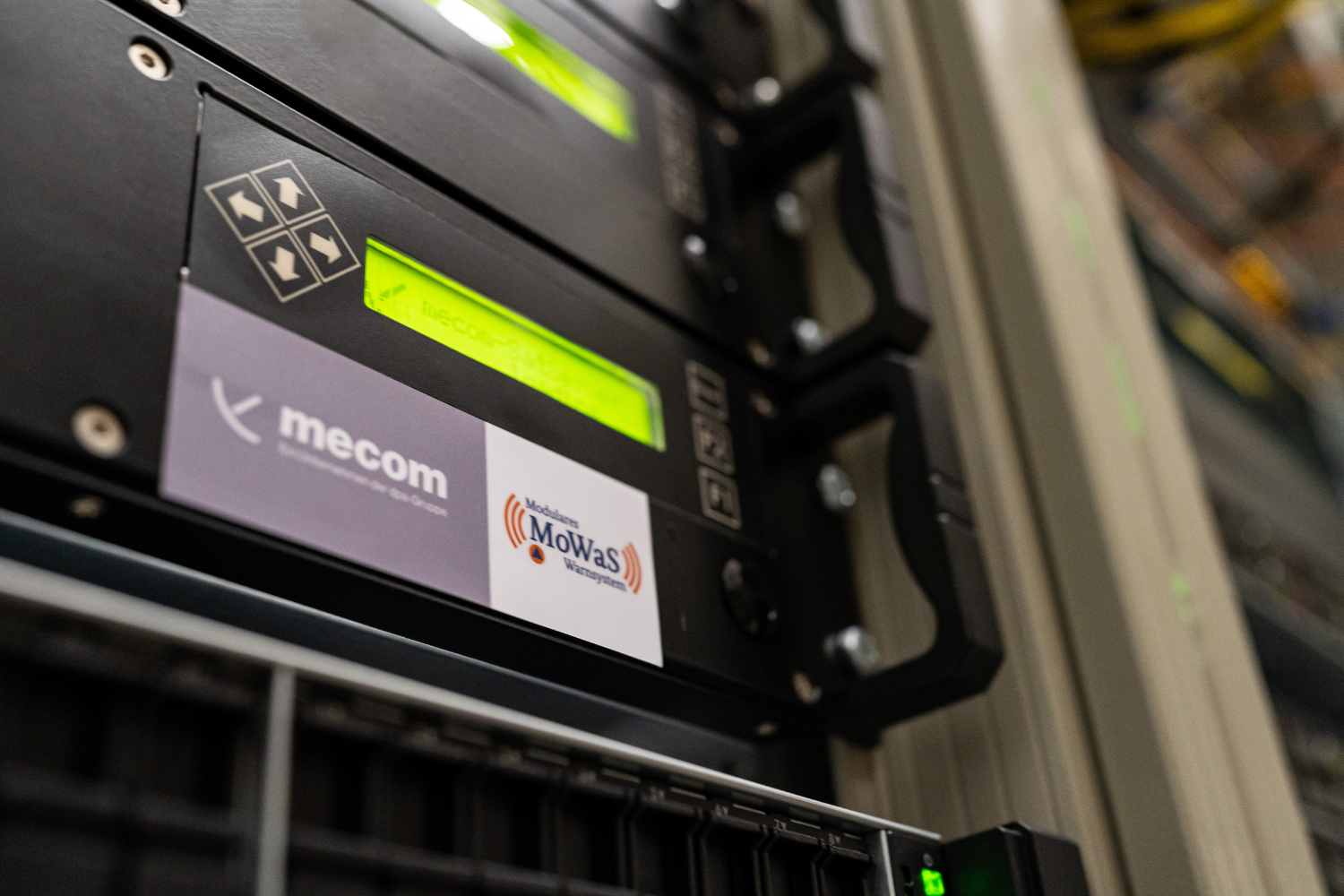mecom attends EENA Conference in Valencia (Spain)

From April 24 to 26, 2024 the EENA Conference & Exhibition 2024 takes place in Valencia. We will attend for the first time.
One year of Cell Broadcast in Germany: 219 disaster alerts were transmitted through smartphones

Hamburg. Storms, fires, floods: over the last year, the German population was alerted to hazards via Cell Broadcast 219 times. For one year, Cell Broadcast has now been in use as part of the alerting infrastructure of the Federal Republic of Germany. It was introduced nationwide on 23 February 2023 to enable alerting people to disasters directly through their smartphones. “From our perspective, Cell Broadcast is a complete success,” states mecom’s Managing Director Alexander Feldmann. “As part of the Modular Warning (MoWaS), which we were commissioned to develop by the Federal Office of Civil Protection and Disaster Assistance (BBK) and are operating for the Federal Republic of Germany, Cell Broadcast serves an important purpose. Through this alerting channel, we can reach a great number of people directly.” “Closely collaborating with public authorities and telecom providers, we were able to introduce Cell Broadcast a year ago. It has been an additional relevant channel for the distribution of alerts in Germany ever since,” adds mecom Managing Director Mandy Best. Largest number of Cell Broadcast alerts in North Rhine-Westphalia Since it was introduced one year ago, Cell Broadcast has been triggered roughly once every one and a half days. Smartphone users in North Rhine-Westphalia received most alerts via Cell Broadcast, with cell phones in Germany’s most populous federal state ringing 59 times. The second highest number of Cell Broadcast alerts – a total of 32 – were transmitted in Rhineland-Palatinate, with Bavaria coming in third with 25 uses of the warning system over the past twelve months. Cell Broadcast has not been used at all so far in the city state of Bremen, while in both Mecklenburg-Western Pomerania and Saxony-Anhalt, the new technology has only been triggered once since its introduction a year ago. Fires most common reason for Cell Broadcast alerts The reasons for triggering alerts via Cell Broadcast are very diverse. Be it the recovery of a bomb from the 2nd World War, forest fires, a failure of the emergency call number, power outages, floods or extreme black ice hazards – in cases of acute danger, the public authorities can alert citizens by sending a message directly to their cell phones. Over the past year, the most common reason for Cell Broadcast alerts was fires. Alerts were triggered 101 times for this reason. This means that almost every second alert, 45 per cent, was caused by fires. The second most common reason for triggering Cell Broadcast alerts were natural hazards and weather events such as floods and heavy thunderstorms (18 per cent). But Cell Broadcast alerts were also used to inform citizens about bomb findings and major events that could jeopardise public safety. Over the previous year, twelve per cent of all alerts were due to these topics. Most alerts issued in June and July The months with by far the most Cell Broadcast alerts in Germany were June and July 2023. 37 alerts were issued in June and 29 in July. The technology was used 24 times in August 2023 and 23 times in May. How Cell Broadcast works In hazardous situations, Cell Broadcast can be used by the fire brigade, the police and disaster protection services. The federal government may use it for civil defence purposes. Alerts can be transmitted directly and specifically to the smartphones of many users. Cell Broadcast is one of many alerting channels that are controlled by the Modular Warning System (MoWaS). MoWaS transmits alerts to numerous connected alerting devices such as TV, radio, alerting apps, digital city billboards, passenger information systems – or cell phones via Cell Broadcast. In the event of a hazard occurring in a specific area, the responsible authorities can issue an alert via MoWaS, which is then sent to the mobile phone customers’ devices through the mobile phone providers’ networks using Cell Broadcast. All devices that are registered in the radio cells of the respective region and support this technology receive the alert and – depending on the alert level – emit a loud tone. Cell Broadcast even works if there is no data connection, and no app is required to receive Cell Broadcast alerts. The mobile device just needs to be compatible with Cell Broadcast, switched on and ready to receive. About mecom mecom Medien-Communikations-Gesellschaft mbH (mecom for short) is a leading player in the fields of high security applications, the transmission of sensitive data and the provision of fail-safe channels for safety-critical communication. The company is also a pioneer in the tamper-proof distribution of alerts in Germany. Headquartered in Hamburg, mecom was founded in 1989 and is a joint venture of the news agencies dpa Deutsche Presse-Agentur GmbH, dpa-AFX Wirtschaftsnachrichten GmbH, KNA Katholische Nachrichten-Agentur GmbH, GEP Gemeinschaftswerk der Evangelischen Publizistik gGmbH with epd and AFP Agence France-Presse GmbH. dpa is the major shareholder and holds a 50 per cent stake in mecom. One year of Cell Broadcast: Cell Broadcast alerts by federal state North Rhine-Westphalia 59 Rhineland-Palatinate 32 Bavaria 25 Hesse 20 Lower Saxony 19 Schleswig-Holstein 19 Baden-Wuerttemberg 10 Brandenburg 8 Saxony 7 Thuringia 7 Hamburg 6 Berlin 3 Saarland 2 Mecklenburg-West. Pom. 1 Saxony-Anhalt 1 Bremen 0 Contact: mecom Medien-Communikations-Gesellschaft mbH Mittelweg 143 20148 Hamburg E-Mail: mail@mecom.de Telephone: +49 (0)40 4113 32800 www.mecom.de
mecom a new member of the non-profit European Emergency Number Association (EENA) in charge of the European emergency number service 112

Since the beginning of this year, we have been a member of Brussels-based European Number Association (EENA).
mecom co-organises exhibition on pandemic communication at the Museum für Kommunikation Berlin/ Opening on 13 July 2023

Berlin. “#Krisenalltag – Kommunikation in der Pandemie” (#Daily crisis business – communication during the pandemic) is the title of a temporary exhibition that will open on 13 July 2023 at the Museum für Kommunikation Berlin (Berlin Museum of Communication). mecom contributes content to and is involved in the organisation of this event. As a practice partner, mecom participates in a project on pandemic communication with the German Federal Institute for Risk Assessment (BfR), and initial research results from this project will be presented in the exhibition. The joint project “Optimierung der Risiko- und Krisenkommunikation von Regierungen, Behörden und Organisationen der Gesundheitssicherung” (MIRKKOMM) is sponsored by the Federal Ministry of Education and Research (BMBF) and has, since the autumn of 2021, been examining the risk and crisis communication of the federal government, states, municipalities, media and new public actors during the corona pandemic. Since mecom acts as a practice partner in project MIRKKOMM, it also plays a significant role in the exhibition on corona communication. Until October 2023, visitors will have the opportunity to look into the digital communication strategies of authorities, the media and influencers and get insights into the communicative dynamics of a pandemic. “We are very pleased to contribute to a project as important as MIRKKOMM and the accompanying public exhibition for the Federal Republic of Germany, together with the BfR, the Federal Office for Civil Protection and Disaster Assistance (BBK) and further high-level institutions such as SHR Berlin University of Applied Sciences, Technische Universität Ilmenau, Karlsruher Institut für Technologie and Europa-Universität Viadrina,” states Mandy Best, Managing Director at mecom. “The Modular Warning System (MoWaS) plays a crucial role in MIRKKOMM and hence also in the exhibition,” says Alexander Feldmann, Managing Director at mecom. “MoWaS, which we are developing and operating for the BBK, generates and disseminates official public alerts and is, especially in times of crisis, an important instrument to alert the population in a quick, transparent and appropriate manner. Therefore, we are running a usability study to investigate how MoWaS can be optimised for users. Together with our project partners, we will present the first findings in the exhibition at the Museum of Communication, and demonstrate how MoWaS was utilised during the pandemic.” The exhibition “#Daily crisis business – communication during the pandemic” takes visitors on an interactive journey through the time of the COVID-19 pandemic and revisits the past three years. Guests can experience the communication surrounding the pandemic with the help of wall screens, a multitouch table and an interactive projection. The exhibition will open at the Museum of Communication on 13 July with a vernissage. Guests include experts from the fields of science and practice as well as representatives of the Federal Ministry of Education and Research. BfR President Prof. Dr. Dr. Andreas Hensel will give a welcoming address. The exhibition will be open to the public until 15 October. Afterwards, it will also be shown in Frankfurt am Main, where it will be on display from 9 November 2023 until March of 2024. About mecom: mecom Medien-Communikations-Gesellschaft mbH (mecom for short) with headquarters in Hamburg was founded in 1989 and is a joint venture of the news agencies dpa Deutsche Presse-Agentur GmbH, dpa-AFX Wirtschaftsnachrichten GmbH, KNA Katholische Nachrichten-Agentur GmbH, GEP Gemeinschaftswerk der Evangelischen Publizistik gGmbH with epd and AFP Agence France-Presse GmbH. dpa is the major shareholder and holds a 50 per cent stake in mecom. As a modern IT services provider, mecom designs and operates innovative and customised solutions for professional communication applications. This includes, in particular, the reliable transmission of sensitive data via satellite in broadcast mode or via web technology. About MoWaS: mecom develops and operates the Modular Warning System (MoWaS) for the Federal Republic of Germany. This is a powerful warning and communication system used by the federal and state governments as well as municipalities to alert and inform the public. The alerts are transmitted via satellite. As opposed to land-based transmission methods such as VHF or mobile communication, satellite communications are less sensitive to interference such as power outages. Contact: mecom Medien-Communikations-Gesellschaft mbH Mittelweg 143 20148 Hamburg Germany Email: mail@mecom.de Phone: +40 40 4113-32800 www.mecom.de Further information on the exhibition: https://mirkkomm.de/wordpress/?page_id=1027
mecom co-organises exhibition on pandemic communication at the Museum für Kommunikation Berlin/ Opening on 13 July 2023

Berlin. “#Krisenalltag – Kommunikation in der Pandemie” (#Daily crisis business – communication during the pandemic) is the title of a temporary exhibition that will open on 13 July 2023 at the Museum für Kommunikation Berlin (Berlin Museum of Communication). mecom contributes content to and is involved in the organisation of this event. As a practice partner, mecom participates in a project on pandemic communication with the German Federal Institute for Risk Assessment (BfR), and initial research results from this project will be presented in the exhibition. The joint project “Optimierung der Risiko- und Krisenkommunikation von Regierungen, Behörden und Organisationen der Gesundheitssicherung” (MIRKKOMM) is sponsored by the Federal Ministry of Education and Research (BMBF) and has, since the autumn of 2021, been examining the risk and crisis communication of the federal government, states, municipalities, media and new public actors during the corona pandemic. Since mecom acts as a practice partner in project MIRKKOMM, it also plays a significant role in the exhibition on corona communication. Until October 2023, visitors will have the opportunity to look into the digital communication strategies of authorities, the media and influencers and get insights into the communicative dynamics of a pandemic. “We are very pleased to contribute to a project as important as MIRKKOMM and the accompanying public exhibition for the Federal Republic of Germany, together with the BfR, the Federal Office for Civil Protection and Disaster Assistance (BBK) and further high-level institutions such as SHR Berlin University of Applied Sciences, Technische Universität Ilmenau, Karlsruher Institut für Technologie and Europa-Universität Viadrina,” states Mandy Best, Managing Director at mecom. “The Modular Warning System (MoWaS) plays a crucial role in MIRKKOMM and hence also in the exhibition,” says Alexander Feldmann, Managing Director at mecom. “MoWaS, which we are developing and operating for the BBK, generates and disseminates official public alerts and is, especially in times of crisis, an important instrument to alert the population in a quick, transparent and appropriate manner. Therefore, we are running a usability study to investigate how MoWaS can be optimised for users. Together with our project partners, we will present the first findings in the exhibition at the Museum of Communication, and demonstrate how MoWaS was utilised during the pandemic.” The exhibition “#Daily crisis business – communication during the pandemic” takes visitors on an interactive journey through the time of the COVID-19 pandemic and revisits the past three years. Guests can experience the communication surrounding the pandemic with the help of wall screens, a multitouch table and an interactive projection. The exhibition will open at the Museum of Communication on 13 July with a vernissage. Guests include experts from the fields of science and practice as well as representatives of the Federal Ministry of Education and Research. BfR President Prof. Dr. Dr. Andreas Hensel will give a welcoming address. The exhibition will be open to the public until 15 October. Afterwards, it will also be shown in Frankfurt am Main, where it will be on display from 9 November 2023 until March of 2024. About mecom: mecom Medien-Communikations-Gesellschaft mbH (mecom for short) with headquarters in Hamburg was founded in 1989 and is a joint venture of the news agencies dpa Deutsche Presse-Agentur GmbH, dpa-AFX Wirtschaftsnachrichten GmbH, KNA Katholische Nachrichten-Agentur GmbH, GEP Gemeinschaftswerk der Evangelischen Publizistik gGmbH with epd and AFP Agence France-Presse GmbH. dpa is the major shareholder and holds a 50 per cent stake in mecom. As a modern IT services provider, mecom designs and operates innovative and customised solutions for professional communication applications. This includes, in particular, the reliable transmission of sensitive data via satellite in broadcast mode or via web technology. About MoWaS: mecom develops and operates the Modular Warning System (MoWaS) for the Federal Republic of Germany. This is a powerful warning and communication system used by the federal and state governments as well as municipalities to alert and inform the public. The alerts are transmitted via satellite. As opposed to land-based transmission methods such as VHF or mobile communication, satellite communications are less sensitive to interference such as power outages. Contact: mecom Medien-Communikations-Gesellschaft mbH Mittelweg 143 20148 Hamburg Germany Email: mail@mecom.de Phone: +40 40 4113-32800 www.mecom.de Further information on the exhibition: https://mirkkomm.de/wordpress/?page_id=1027
Alert Day Bavaria and NRW 2023

Positive conclusion after the Alert Day in Bavaria and NRW: mecom’s warning systems worked smoothly. Yesterday morning at 11 a.m., a state-wide Alert Day was held in Bavaria and North Rhine-Westphalia. The interior ministries of the two federal states triggered a test alert to test their critical infrastructure as well as the connection of all relevant alert multipliers and alerting devices. The Modular Warning System (MoWaS) serves as a central message hub for the control and dissemination of official population alerts. Since 2001, the system has been operated by mecom Medien-Communikations-Gesellschaft mbH for the German Federal Office for Civil Protection and Disaster Assistance (BBK). Consequently, MoWaS was one of the focal points of yesterday’s Alert Day. “As was the case on the nationwide Alert Day in December 2022, our technical infrastructure again functioned flawlessly and smoothly yesterday,” stated Alexander Feldmann, Managing Director at mecom. “We are very satisfied with the course of the Alert Day in Bavaria and North Rhine-Westphalia and draw a positive conclusion all around.” Mandy Best, Managing Director at mecom, added, “With the flawless performance of our technical systems, we were able to contribute significantly to the successful course of the Alert Day. Our team once again did an excellent job, ensuring that all systems functioned 100 per cent around the clock every day.” About the Alert Day in Bavaria and NRW:On yesterday’s Alert Day, the German federal states of Bavaria and North Rhine-Westphalia tested their warning systems in a joint trial. In the course of the Alert Day, the participating authorities and emergency forces activate different warning systems and alerting devices, such as radio and television, digital city display boards or alerting apps. The existing alerting devices are tested depending on their availability and deployment options. In this way, the technical processes in the event of an alert and also the alerting devices themselves can be checked for their function and for possible weak points. In the follow-up, the responsible agents make improvements, if necessary, to make the population warning system even safer. Alert Day also serves the purpose of informing people about population alerts and thus raise their awareness of the topic. About mecom:mecom Medien-Communikations-Gesellschaft mbH (mecom for short) with headquarters in Hamburg was founded in 1989 and is a joint venture of the news agencies dpa Deutsche Presse-Agentur GmbH, dpa-AFX Wirtschaftsnachrichten GmbH, KNA Katholische Nachrichten-Agentur GmbH, GEP Gemeinschaftswerk der Evangelischen Publizistik gGmbH with epd and AFP Agence France-Presse GmbH. dpa is the major shareholder and holds a 50 per cent stake in mecom. As a modern IT services provider, mecom designs and operates innovative and customised solutions for professional communication applications. This includes, in particular, the reliable transmission of sensitive data via satellite in broadcast mode or via web technology. About MoWaS:mecom develops and operates the Modular Warning System (MoWaS) for the Federal Republic of Germany. This is a powerful warning and communication system used by the federal and state governments to alert and inform the public in civil protection and disaster scenarios. The alerts are transmitted via satellite. As opposed to land-based transmission methods such as VHF or mobile communication, satellite communications are less sensitive to interference such as power outages.Further information on Alert Day: www.warnung-der-bevoelkerung.de
Alert Day 2022

Nationwide Alert Day Alert Day 2022: mecom’s warning systems have performed successfully in the nationwide tests. Hamburg. Alert Day 2022 took place across Germany this morning. The purpose of the nationwide Alert Day is to familiarize the population in Germany with alerts that might be used, for example, in the event of dangerous weather conditions, power outages and other hazards. The federal, state and local governments took part and tested their alerting devices in a joint trial alert. In particular, the technical procedures in the event of a warning were tested. Consequently, mecom’s warning systems also participated in the trial. Among others, mecom operates the Modular Warning System (MoWaS), which is used by situation and control centres across Germany to create and disseminate alerts. “We are very pleased that the course of the Alert Day was extremely positive from our point of view,” said mecom’s Managing Director Alexander Feldmann. “Our systems, above all the Modular Warning System, worked flawlessly, without any malfunctions. This way, we made a significant contribution to the success of the nationwide Alert Day.” Mandy Best, Managing Director at mecom, added, “We’ve been preparing for Alert Day for months. Our team has been working under high pressure and very conscientiously to ensure that all systems work flawlessly and that Alert Day is a success.” mecom is also technically involved in the new cell broadcast standard, which was tested for the first time yesterday. This new alerting channel has not been fully implemented yet. Cell broadcast is to be released for the alerting bodies of the Modular Warning System by the end of February 2023, once the test phase is completed. About Alert Day:On this day of action, the federal and state governments, participating counties, independent cities and municipalities test their alerting devices in a joint trial. In the course of the Alert Day, the participating authorities and emergency forces activate different warning systems and alerting devices, such as radio and television, digital city display boards or alerting apps. The existing alerting devices are tested depending on their availability and deployment options. In this way, the technical processes in the event of an alert and also the alerting devices themselves can be checked for their function and for possible weak points. In the follow-up, the responsible agents make improvements, if necessary, to make the population warning system even safer. Alert Day also serves the purpose of informing people about population alerts and thus raise their awareness of the topic. About mecom:mecom Medien-Communikations-Gesellschaft mbH (mecom for short) with headquarters in Hamburg was founded in 1989 and is a joint venture of the news agencies dpa Deutsche Presse-Agentur GmbH, dpa-AFX Wirtschaftsnachrichten GmbH, KNA Katholische Nachrichten-Agentur GmbH, GEP Gemeinschaftswerk der Evangelischen Publizistik gGmbH with epd and AFP Agence France-Presse GmbH. dpa is the major shareholder and holds a 50 per cent stake in mecom. As a modern IT services provider, mecom designs and operates innovative and customised solutions for professional communication applications. This includes, in particular, the reliable transmission of sensitive data via satellite in broadcast mode or via web technology. About MoWaS:mecom develops and operates the Modular Warning System (MoWaS) for the Federal Republic of Germany. This is a powerful warning and communication system used by the federal and state governments to alert and inform the public in civil protection and disaster scenarios. The alerts are transmitted via satellite. As opposed to land-based transmission methods such as VHF or mobile communication, satellite communications are less sensitive to interference such as power outages. Further information on Alert Day: www.warnung-der-bevoelkerung.de
Mandy Best new Managing Director

Mandy Best to be mecom’s new Managing Director, forming a dual leadership with Alexander Feldmann dpa restructures mecom’s management. As of June 1, Mandy Best (46) will join the incumbent Managing Director Alexander Feldmann (53) to form a dual leadership. Mandy Best succeeds Barbara Bliefert (64), who is taking well-deserved retirement. mecom Medien-Communikationsgesellschaft mbH specialises in the secure and reliable transmission of sensitive data for professional applications. The majority shareholder of the Hamburg-based company is dpa. The other stakes in the company, each equal in size, are held by four other news agencies. “In Mandy Best, we have found the ideal person for mecom. She will continue the successful growth story together with Alexander Feldmann,” stated dpa’s CEO Peter Kropsch. “At the same time, I want to thank Barbara Bliefert, who is retiring after 22 years of working for dpa Group, out of which she served eleven years as a Managing Director at mecom. During this time, Barbara Bliefert has provided significant impetus for the company and successfully transformed mecom,” Peter Kropsch added. “l’m looking forward to collaborating with Mandy Best. mecom will benefit from her expertise in product and project management in numerous growth areas,” said mecom Managing Director Alexander Feldmann. “I am sure that we’ll achieve a lot together.” Mandy Best joins dpa from A. Stein`sche Mediengruppe GmbH in Werl, where she was in charge of product and project management. From 2007 until 2016, Mandy Best worked for Axel Springer in Berlin and Hamburg, serving, among other positions, as a Senior IT Project Manager and Speaker of the CIO. This was followed by engagements at Safebridge GmbH and ims Internationaler Medienservice GmbH & Co.KG. Mandy Best studied Business Informatics at the Elmshorn University of Applied Sciences. About mecom:mecom Medien-Communikations-Gesellschaft mbH (mecom for short) with headquarters in Hamburg was founded in 1989 and is a joint venture of the news agencies dpa Deutsche Presse-Agentur GmbH, dpa-AFX Wirtschaftsnachrichten GmbH, KNA Katholische Nachrichten-Agentur GmbH, GEP Gemeinschaftswerk der Evangelischen Publizistik gGmbH with epd and AFP Agence France-Presse GmbH. dpa is the major shareholder and holds a 50 per cent stake in mecom. As a modern IT services provider, mecom designs and operates innovative and customised solutions for professional communication applications. This includes, in particular, the reliable transmission of sensitive data via satellite in broadcast mode or via web technology. mecom develops and operates the Modular Warning System (MoWaS) for the Federal Republic of Germany. MoWaS enables federal, state, county and city governments to disseminate official alerts at any time through newsrooms, alerting apps and many other channels. About dpa:The German Press Agency (dpa) was founded in 1949 and is one of the world’s leading independent news agencies. dpa supplies media outlets, companies and organisations with editorial content. As an international agency, dpa reports in seven languages. Approximately 1,000 journalists work for dpa from around 150 locations in Germany and abroad. dpa’s shareholders are 177 German media outlets. The agency’s editorial office works according to the principles laid down in dpa’s statute: independent of world views, business or governments. The central editorial office, headed by Editor-in-Chief Sven Gösmann, is located in Berlin. The Executive Board around its Chairman Peter Kropsch is based at the company’s headquarters in Hamburg. The Chairman of the Supervisory Board is David Brandstätter (Main-Post GmbH, Würzburg).










